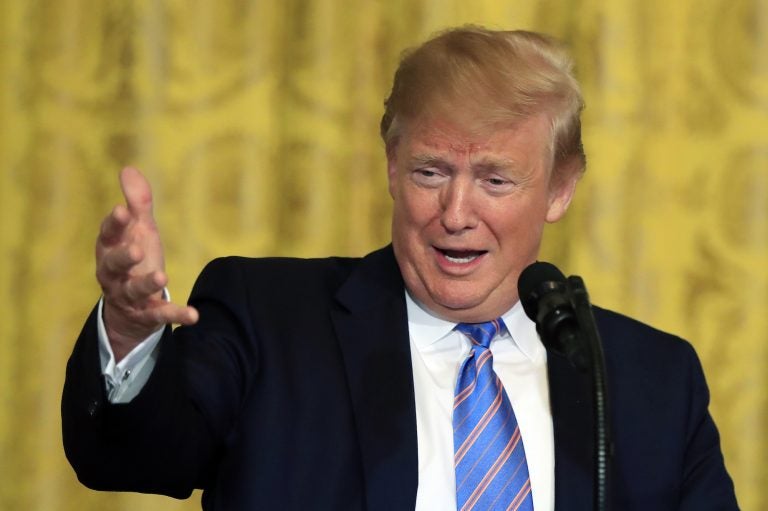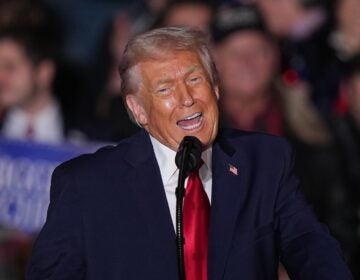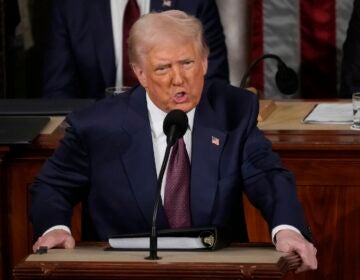What Democrats fear most in 2020: A bullish Trump economy
We need to acknowledge the reality that presidents typically get re-hired when voters believe the economy is on the upswing.

President Donald Trump speaks during a celebration of military mothers with first lady Melania Trump in the East Room of the White House in Washington, Friday, May 10, 2019. (Manuel Balce Ceneta/AP Photo)
Here’s why it shouldn’t shock us if Donald Trump wins a second term in 2020:
“Now Hiring” signs in local shop windows are potentially more persuasive than abstract phrases like “Constitutional Crisis.” Jobs and wages affect everyone everywhere; Washington court battles and executive-congressional clashes can be easily dismissed as distant thunder.
I’m not endorsing that scenario. Far from it. But in the wake of the newest Labor Department stats — a 3.6% jobless rate, the lowest in nearly 50 years; hourly wages up by two-tenths of a percent during April; a 3.2% boost in the GDP during the first quarter of 2019 — we need to acknowledge the reality that presidents typically get re-hired when voters believe the economy is on the upswing.
Granted, this particular president — and I use that honorific advisedly — is a serial liar whose Russian-style authoritarian instincts are damaging our democratic institutions in all the ways that many of us foresaw in 2016. But his defenders may be right when they insist that a strong economy will ultimately trump everything else. Mick Mulvaney, the acting chief of staff, says: “People will vote for somebody they don’t like if they think it is good for them.” Former GOP congressman and Trump fan Jason Chaffetz tells Fox News that “when people feel good at home, they’re going to stick with the person who has the White House.”
Maybe that’s just wishful thinking on their part; despite the bullish economy, Trump is saddled with a 42% approval rating. But prominent Democrats are nevertheless worried that their party doesn’t have an overarching economic message. They know how important that is. Their mantra in 1992, the last time they defeated a Republican presidential incumbent, was “It’s the Economy, Stupid.” Bill Clinton toppled George H.W. Bush in part because, midway through the election season, the steadily ascending jobless rate spiked to 7.8%.
Matt Bennett, an ex-Clinton White House aide who now works for Third Way, a center-left group, is frank about the Trump-era economy: “There are things about this economy that are very popular — low unemployment, a lot of jobs [230,000 new ones in April], there’s been some real wage increase. [Trump] will claim credit, as he does for the sun rising and everything else, and we have to be aware that that could be potent.” Celinda Lake, a veteran Democratic pollster, is far blunter: “You may agree or not with [Trump’s boasting economic message], but you know what it is. And Democrats, you don’t know what it is. And that’s a recipe for disaster in 2020.”
At least Democrats aren’t claiming that the jobless stats are fake; that’s what candidate Trump routinely used to do. Whenever President Obama’s Labor Department reported job gains for the economy that was slowly recovering from the Great Recession, Trump would lie that the government had “cooked the books” (October 2015), or released “phony jobs numbers” (January 2016), or perpetrated “one of the biggest hoaxes in modern politics” (August 2016). But now that he’s the guy in the White House, he suddenly believes that the bullish numbers are accurate. Democrats concede that the numbers are accurate; rather than sink to Trump’s level by lying about them, they simply prefer not to talk about them.
What they’re trying to do is talk around them. The basic Democratic argument — from Joe Biden, Elizabeth Warren, Amy Klobuchar, Elizabeth Warren, and others — is that, yes, the top-line economic stats look good, but that most Americans still feel pinched in their everyday lives. Klobuchar tells ABC News: “A lot of people aren’t sharing this prosperity, because of the costs — the cost of college, the costs of health care, the fact that the president had promised to bring down the prices of their prescription drugs.”
All those things are true; for instance, the number of Americans without health coverage has increased by seven million since Trump took office. The problem is that the Democrats are stuck with a “Yes But” argument, and that’s not ideal. A new Washington Post-ABC poll asked: “Does Trump’s handling of the economy make you more likely or less likely to support him in 2020?” Forty-two percent said “more likely.” Only 32 percent said less. (Could some of Trump’s voters dump him if they fear that his tariff war with China will undercut the economy by hiking consumer prices? Don’t bet on it. If Trump personally tiki-torched their houses, they’d praise the smell of smoke.)
For Democrats, the most optimistic scenario is that the “Yes But” argument will suffice, that a good economy will not save a lawless president saddled with unprecedented baggage. In the words of Democratic commentator and ex-policy strategist Ed Kilgore, “Trump’s going to have to campaign on his full record, his full agenda, and the full set of impressions he has made during his first term…And even if things look good [economically], the future will look dim to those who fear what Trump will do in a second term.”
I’ll put it this way: Are bullish jobless stats more important than the relentless assault on America’s soul?
WHYY is your source for fact-based, in-depth journalism and information. As a nonprofit organization, we rely on financial support from readers like you. Please give today.




